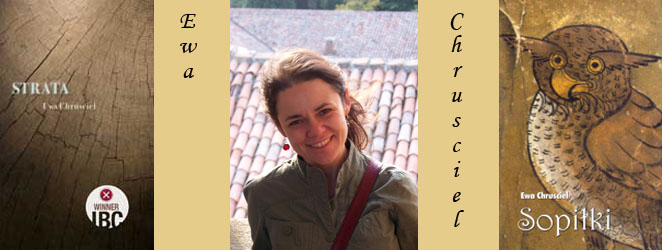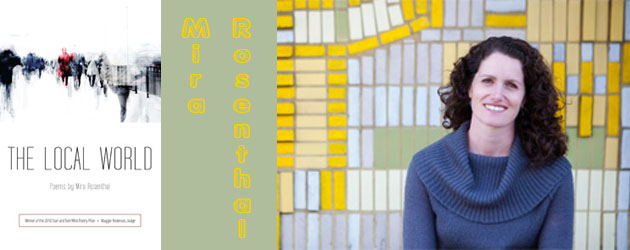Ewa Chrusciel and Mira Rosenthal
Monday August 27, 2012 at 7:30 PM
1719 25th Street
Host: Tim Kahl
Ewa Chrusciel writes both in Polish and English. In 2003 Studium published her first book in Polish. Her second book in Polish: Sopilki came out in Dec 2009. She has won the 2009 international book contest for her book in English, Strata, which was published with Emergency Press in March 2011 in the United States. Her second book in English Contraband of Hoopoe is forthcoming with Omnidawn Press. Her third book Dybbuk of Angelus has been a finalist with River Run Press. Her poems were featured in Jubilat, Boston Review, Colorado Review, Lana Turner, Spoon River Review, Aufgabe among others. Her translations of poetry appeared in numerous journals and two anthologies of Polish poetry in English translations: Carnivorous Boy, Carnivorous Bird and Six Polish Poets. She is a Professor of Humanities at Colby-Sawyer College.
Sausage and Gingko
I buy a sausage at the airport before I leave Poland. This, my transcontinental dowry. Sizzles. Folkberg variations. Folk cabbala. Kiełbaska, kiełbasa, kabanos, kabanosik. Swaddled offspring. The sacrificial baby of my tongue. Foreign gods hover over. Forage replete. Dogwoods grow in silence. I will offer this flower of Polish fields to the Lady Liberty. On landing, I promise myself to leave the sausage behind in the nearest bathroom. If God lets my sausage in, I will eat it like a saint wreathed in incense, circle a table with Gregorian chants. The baggage carousel spurts my luggage out. With the air of utmost conspiracy, I transfer my sausage from a carry-on into checked luggage. I look around. I pray for my sausage while I move towards customs. Angelus trickles. Angelus salivates. St George is about to put his spear through a sizzling dragon. My luggage goes through a “sausage scan.” The juices drained, sterile. Can an old sausage be born young again? The officer pulls me aside. The officer holds my sausage to the light. His babushka trophy. “It’s a sealed sausage.” I declare with pride. I’ve brought a new species. “But you declared: no meats,” the officer says. “Sealed Sausage is not a meat?” “Sealed sausage is a sealed sausage!” I say, and, the guardian angels of my sealed sausage swarm. They sow faces under the investigation light. The officer blinks when I repeat with determination: “A sealed sausage is a sealed sausage.” He looks, blinded. The hypnotic alliteration throws him back to the waters of his childhood where eels jiggle Scottish dances. Oh, sweet detained sausage. Saint of arrests pray for us. May my new species have mercy on us. Escape at the borders. Oh, oven bird, whose migratory song is a sausage a sausage a sausage. And tower of Lady L, feed us. The sausage of martyrs. Sealed patriarch. Let the Virgin Liberty swallow it.
From Contraband of Hoopoe forthcoming with Omnidawn Sep 2014
Mira Rosenthal is the author of The Local World, which won the 2010 Stan and Tom Wick Poetry Prize, as well as two volumes of poetry translations. Among her awards are fellowships from the National Endowment for the Arts, the PEN American Center, the MacDowell Colony, and the Fulbright Commission. Her poems and translations have been published in many literary journals and anthologies, including Ploughshares, APR, Harvard Review, and A Public Space. You can listen to her read her work on Slate and The Cortland Review. Mira holds a B.A. from Reed College, an M.F.A. from the University of Houston, and a Ph.D. in comparative literature from Indiana University. Her dissertation, “The Refugee’s Refuge: Czesław Miłosz, Translation, and the Circulation of Poetry After World War II,” examines the career of the Polish Nobel laureate from the perspective of his translation work. She is also a Wallace Stegner Fellow at Stanford University. Raised in Northern California, Mira lives with her husband, historian Greg Domber, and two daughters in Berkeley, CA.
Heat
A languor sitting down on the stone lap of Buddha.
In Rishikesh I remember heat like that.
The chanting of bhajans infusing the town
as I was walking by the languor sitting like Buddha.
In Rishikesh I remember heat like that.
Sweat cooled by the breeze off the Ganges River.
Wind carrying bhajans through the dress of soft cotton
covering me as I walked by the monkey and the statue.
In Rishikesh I remember heat like that.
Concentration required for a simple silence. Smell of samosas
browning in grease. Sweat of the body’s boiling and motion.
The breeze off the Ganga, the chanting of bhajans
infusing my walking and the languor sitting by Buddha.
In Rishikesh I remember heat like that.
Green saplings over the hill where the water falls. Thoughts drifting
through the mind in concentration, in a simple silence
when the smell of hot batter frying in oil descended
into evening, into prayer, into bhajans. The rustle
of my walking startled the monkey who sat cross-legged
with Buddha. A red sun in Rishikesh. I remember heat like that.
The smell of diesel from rickshaws careening down the hill
where boys soaked in hot water, thinking nothing, thinking simply
about frying samosas, flies buzzing around them
and sadhus sat cross-legged singing and chanting
as I passed and the sun bit the lip of the river, sank light
into stone of a statue, into hair, into silver on the back of a monkey
running from Buddha. A red sun in Rishikesh. I remember heat like that.






